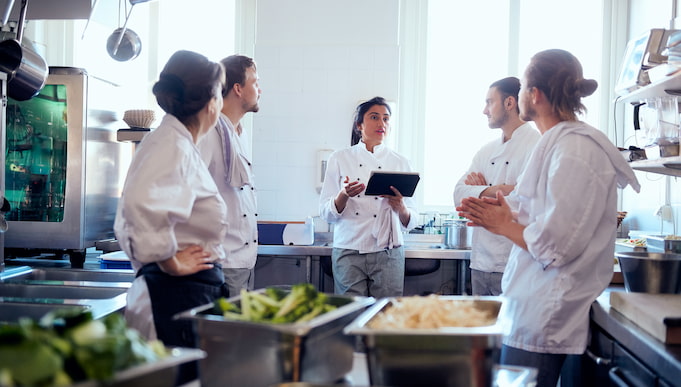How to become a food consultant

Introduction: what is a food consultant?
The multi-billion-dollar food industry is booming. However, starting and running a restaurant can be complex - food safety regulations, training, culinary development, and profit margins are vital to get right if a business is to be a success.
This is where food consultants step in. A food consultant is a professional who provides specialized expertise and guidance to businesses in the food industry.
This is an ideal career if you have a passion for the culinary arts while possessing a strong business sense. So, if you're a career changer or a recent graduate intrigued by the food and restaurant industry, this article will guide you through the journey of how to become a successful food consultant.
What is food consulting?
A food & beverage consultant with insights and solutions that help businesses improve their operations, comply with regulations, and enhance their products and services.
They bridge the gap between culinary expertise, business acumen, and regulatory compliance, ensuring their clients thrive in a competitive market.
Types of food consulting services
Food consultants offer a diverse range of services, catering to various parts of the food industry. They assist businesses with, for example, food safety protocols, menu planning, restaurant operations, product development, and marketing strategies.
These can all significantly impact the success and reputation of any food business. As an example, food consultants can help prevent foodborne illnesses by implementing rigorous safety measures, leading to increased customer trust and loyalty.
Thanks to increased consumer demand for healthy and innovative food options, the food consulting industry is projected to experience significant growth of 14% and produce more than 770,000 jobs across the US by 2028.
How a restaurant benefits from hiring a food consultant
For restaurants, the advantages of hiring a food consultant are numerous. These experts bring valuable insights and knowledge to the table, helping businesses streamline operations, enhance food safety, and drive profitability.
Food consultants can also assist in identifying emerging food trends, ensuring businesses stay ahead of their competitors. Even the top chefs of the world in Michelin-starred restaurants draw on the expertise of food consultants, so these skills will always be in demand as they can help deliver cost savings, improved customer satisfaction, and increased revenue.
How to become a food consultant
The food service industry is constantly changing, so ongoing education is crucial for food consultants so they stay up to date on all the latest trends, regulations, and best practices.
This commitment to learning ensures consultants provide the most accurate and effective advice to their clients.
Education and training to become a food consultant
Becoming a food consultant requires a solid educational foundation and relevant experience in the hospitality industry. A bachelor's degree in a food-related field, such as culinary arts or food science, is typically the minimum requirement.
Additionally, hands-on experience gained through internships, apprenticeships, or entry-level jobs in the food industry is essential. It’s a great option if you have an interest in the food industry but are looking at alternative culinary careers to becoming a chef or owning a restaurant. To embark on the journey towards becoming a food consultant, we’d recommend you follow these steps:
- Education: obtain a bachelor's degree in a food-related field.
- Experience: gain practical experience in the food industry through internships, apprenticeships, or entry-level positions. Some food consultants start their career as a chef and decide they want to use their skills in a different area of the industry. This background really helps you develop menu strategies.
- Continuing education: stay up to date with industry trends and regulations by pursuing relevant courses and certifications.
- Networking: build a professional network in the food industry to connect with potential clients and colleagues.
- Specialization: consider specializing in areas such as food safety, menu planning, or restaurant operations to stand out in the field. If your background is in French cooking techniques, for example, you could be in demand by restaurants that want to incorporate this style of cooking. Finding your niche is also great for business development and finding new clients who might need your help.
- Build a portfolio: showcase your expertise through case studies, projects, and success stories that highlight your ability to solve real-world food industry challenges.
Essential skills and knowledge for a career as a food consultant
Aside from formal training and education in food consultancy, there are also a number of soft skills needed by food consultants if they are to succeed and progress in their careers.
These will help set you apart if you create your own food entrepreneurship business, so try to work on them and develop your unique selling points to help you build your client base.
- Food safety: in-depth understanding of food safety regulations and the ability to develop and implement food safety plans is vital for restaurants to meet strict food safety measures.
- Communication: you will need excellent communication skills to effectively interact with clients, colleagues, and regulatory agencies.
- Problem-solving: the ability to think critically will help you identify and solve complex issues creatively.
- Leadership: it’s important you are able to inspire trust, build relationships, and lead teams effectively.
- Business acumen: basic understanding of financial statements, business plans, and budget management to provide guidance is vital.
What are the duties of a food consultant?
The role of a food consultant is varied and can depend on the client and the scope of the project, but tasks will range from working on new menus to training staff.
A food consultant’s main duties include: Conducting food safety assessments: identifying and mitigating food safety risks and implementing safety protocols.
Developing new food products: collaborating with clients to create innovative recipes, menus, and marketing materials. This is a great way to use your skills if you trained as a chef and are looking for alternative careers using your culinary abilities.
Consulting on restaurant operations: enhancing operations, menu planning, and customer service strategies for restaurants. Training food service staff: providing training on food safety, preparation techniques, and customer service to food service staff.
Career paths for food consultants
Whether you want to start your own food consultancy business and work for yourself, write a book, or prefer to work in-house for organizations, there are many different ways of utilizing your skills as a food consultant.
- Independent consultant: operating your own food consulting firm, specializing in areas such as food safety, menu planning, or restaurant operations. Teaming up with a chef consultant would allow you both to focus on your distinct areas of expertise, offering clients a bespoke package.
- Consultant for a food company: providing advice and support to food companies in areas such as food safety, food quality, marketing, and product development.
- Consultant for a government agency: offering expertise on food safety regulations and participating in inspections and investigations.
- Educator: teaching courses on food safety, nutrition, or culinary arts at educational institutions or government agencies.
- Author: writing books, articles, and blog posts on food-related topics and creating recipes or marketing materials.
Salary and benefits: how much can you earn as a food consultant?
Salaries for a food industry consultant can vary based on factors such as experience, education, and location. The average salary in the US for food consultants is $50,000 per year, but this could increase to as much as $141,000 for the top 10% in the field.
If you set up your own food consultancy business, you will have much more control over your earning potential as you can be more flexible in how much you work and what your rates are. And your rates will only improve as your portfolio does.
Financial compensation may vary, but the opportunity to make a positive impact on businesses and the food industry is also a rewarding aspect of this profession.
Conclusion
Becoming a food consultant is an exciting journey into the food & beverage industry that requires a blend of culinary passion, business acumen, and regulatory knowledge. As a food consultant, you can play a crucial role in shaping the success of businesses in the dynamic food industry.
By pursuing education, gaining practical experience, and continuously updating your skills, you can become a sought-after expert who brings value to clients, fosters innovation, and contributes to the growth of the food industry.
Photo credits
Main image: Westend61/ Westend61 via getty images
2nd image: Maskot/Royalty-free via getty images



